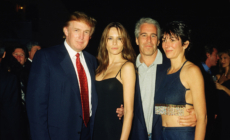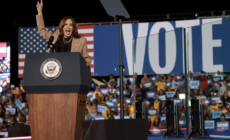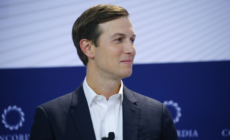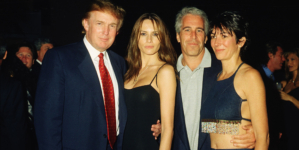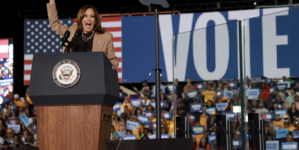-
McLaren Are Launching Appeal Against United States Grand Prix Penalty - 14 mins ago
-
Negotiations between farmworkers, Wonderful can continue, court rules - 36 mins ago
-
‘Conclave’ Review: Serpents and Doves Amok in the Vatican - 43 mins ago
-
Donald Trump’s Ties to Jeffrey Epstein—Everything We Know - 49 mins ago
-
Avoid carmageddon as sports fans head to the World Series - about 1 hour ago
-
Harris Dispatches More Republicans, Celebrities to Battleground States - about 1 hour ago
-
A Poem Hitches a Ride on a Rocket, to Infinity and Beyond - about 1 hour ago
-
Nursery owned by Rep. John Duarte has history of safety violations - 2 hours ago
-
Parents Hear Voice From 8-Month-Old’s Cot, Can’t Cope With What They Find - 2 hours ago
-
Watch Ralph Fiennes Deliver a Startling Speech in ‘Conclave’ - 2 hours ago
Donald Trump Couldn’t Get a Job at McDonald’s. He’s a Felon | Opinion
The news cycle over the last few days has been buzzing with the bizarre story of former President Donald Trump’s “shift” at McDonald’s. It’s almost cartoonish to picture the former president flipping burgers, taking orders, or restocking fries—something straight out of a really good Saturday Night Live sketch.
But while we’re caught up in the image of Trump in a golden arches apron, slinging Big Macs, there’s a much bigger, yet widely ignored, reality at play. The truth is, Donald Trump couldn’t be hired by McDonald’s. Why? Because he’s a convicted felon.
With more than 91 charges and 34 felony convictions spanning multiple cases, including the classified documents scandal and the attempt to overturn election results, it’s a bad look—really bad. What we all need to understand is that with the first conviction, the idea of Trump working at McDonald’s became more than just laughable. It became legally impossible.

Doug Mills-Pool/Getty Images
To understand why Trump couldn’t work at McDonald’s, let’s take a look at the company’s hiring practices. McDonald’s, like many other major corporations, has strict policies when it comes to hiring felons, especially in certain states. Some locations may have programs in place to provide second chances to non-violent offenders, but these exceptions are usually for low-level felonies or misdemeanors.
In fact, in many states, federal and state laws make it difficult for convicted felons to work in certain positions within any fast-food establishment. This often depends on the nature of the felony. White-collar crimes, fraud, or anything that hints at dishonesty makes an applicant particularly unappealing, for obvious reasons. When you’re trusted with handling money, customer data, and food service protocols, there’s a lot at stake, even in an entry-level position.
Given the seriousness of some of the charges Trump faces—including charges of conspiracy to defraud the United States—it’s safe to say he wouldn’t exactly be an ideal candidate to work the cash register. McDonald’s, like any other business, wouldn’t want to hire someone with a potential history of fraud, especially when it involves tampering with elections or classified documents.
What’s even more astonishing than the fact that Trump couldn’t land a job at McDonald’s due to his looming legal issues is that the Democratic political machine has been eerily silent on this fact. You’d think that a headline like “Donald Trump Wouldn’t Be Allowed to Work at McDonald’s” would be a 24-hour news cycle bombshell.
Imagine the viral content: “Trump may have run the country, but he can’t even get a job at your local drive-thru.” It’s catchy, it’s timely, and it’s factually accurate.
But instead, the media has barely touched this angle. Sure, we’ve seen endless chatter about Trump’s trials, his indictments, convictions, and his overall criminal liability, but no one has seized on the comedic, yet poignant, fact that Trump’s status as a felon would disqualify him from working in one of the most common and iconic American jobs.
The Democratic Party’s media arm is typically adept at seizing on such opportunities. Yet, on this one, they’ve let it pass by. Maybe it’s because the very idea of Trump working a shift at McDonald’s is too absurd to even register in political discourse. After all, this is a man who has spent his life in gold-plated penthouses and bathrooms, flying in private jets, and playing golf at exclusive resorts. The contrast is so stark, it might be hard for even the most seasoned Democratic strategist to believe that voters would take the idea seriously.
But therein lies the problem. The Democratic Party often misses chances to connect to the working-class experience when it comes to framing Trump’s legal battles. This could have been one of those moments. Imagine the Democratic messaging: “Trump can’t relate to your average American because, well, he couldn’t even be legally hired at your average job.” The symbolism of that is powerful. It could have been used to highlight Trump’s disconnection from working-class voters, who remain some of his most ardent supporters despite his billionaire status and legal troubles.
So why hasn’t the media capitalized on this obvious narrative? Perhaps it’s because it doesn’t fit neatly into the rigidly binary, partisan-driven structure of news today. Instead of focusing on these subtle but significant points, we’re caught in the loop of repeating updates on Trump’s legal woes, campaign rallies, and the daily chaos of his political persona.
Moreover, the mainstream media tends to lean on broader, more digestible headlines that don’t require as much context. Talking about Trump’s inability to work at McDonald’s as a convicted felon takes some nuance. It requires explaining McDonald’s hiring policies, the laws around felon employment, and why Trump’s legal situation is more dire than it appears on the surface. In today’s fast-paced media world, such stories get lost amid the noise of clickbait headlines and sensationalized reporting.
But beyond the missed media opportunity, there’s a deeper point here: Trump’s legal status does matter. It matters to the extent that it would impact his ability to participate in basic aspects of society, like working at a fast-food joint. In being convicted of even one felony, never mind 34, he is barred from doing what is perceived as even the most routine of jobs. So how can he hold the most powerful office in the world? That should have been the Democratic media message from the second Trump slid away from the deep fryer.
A Pulitzer Prize-nominated writer, Aron Solomon, JD, is the chief strategy officer for Amplify. He has taught entrepreneurship at McGill University and the University of Pennsylvania, and was elected to Fastcase 50, recognizing the top 50 legal innovators in the world. Aron has been featured in Newsweek, Fast Company, Fortune, Forbes, CBS News, CNBC, USA Today, ESPN, Abogados, Today’s Esquire, TechCrunch, The Hill, BuzzFeed, Venture Beat, The Independent, Fortune China, Yahoo!, ABA Journal, Law.com, The Boston Globe, and many other leading publications across the globe.
The views expressed in this article are the writer’s own.
Source link





